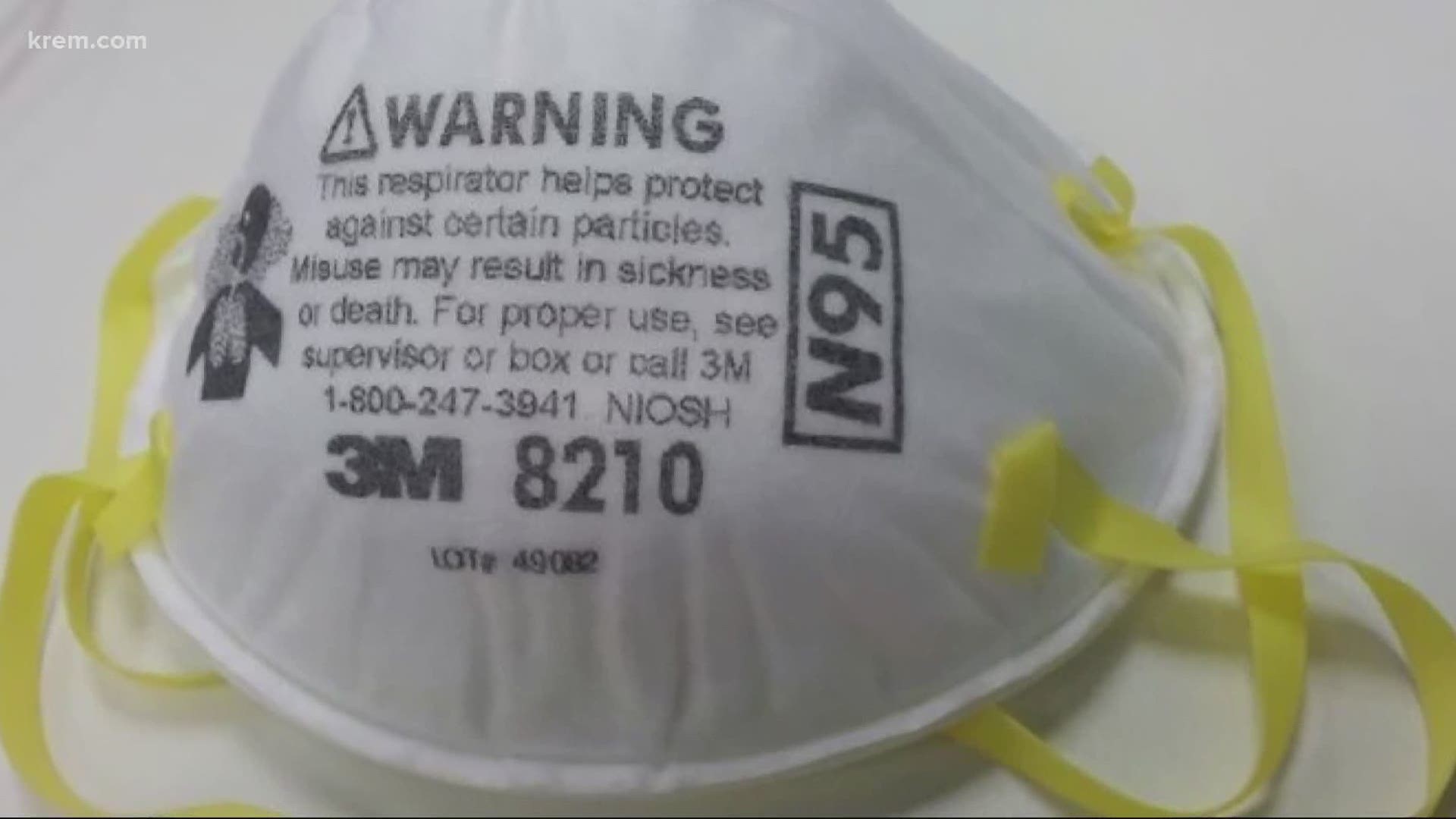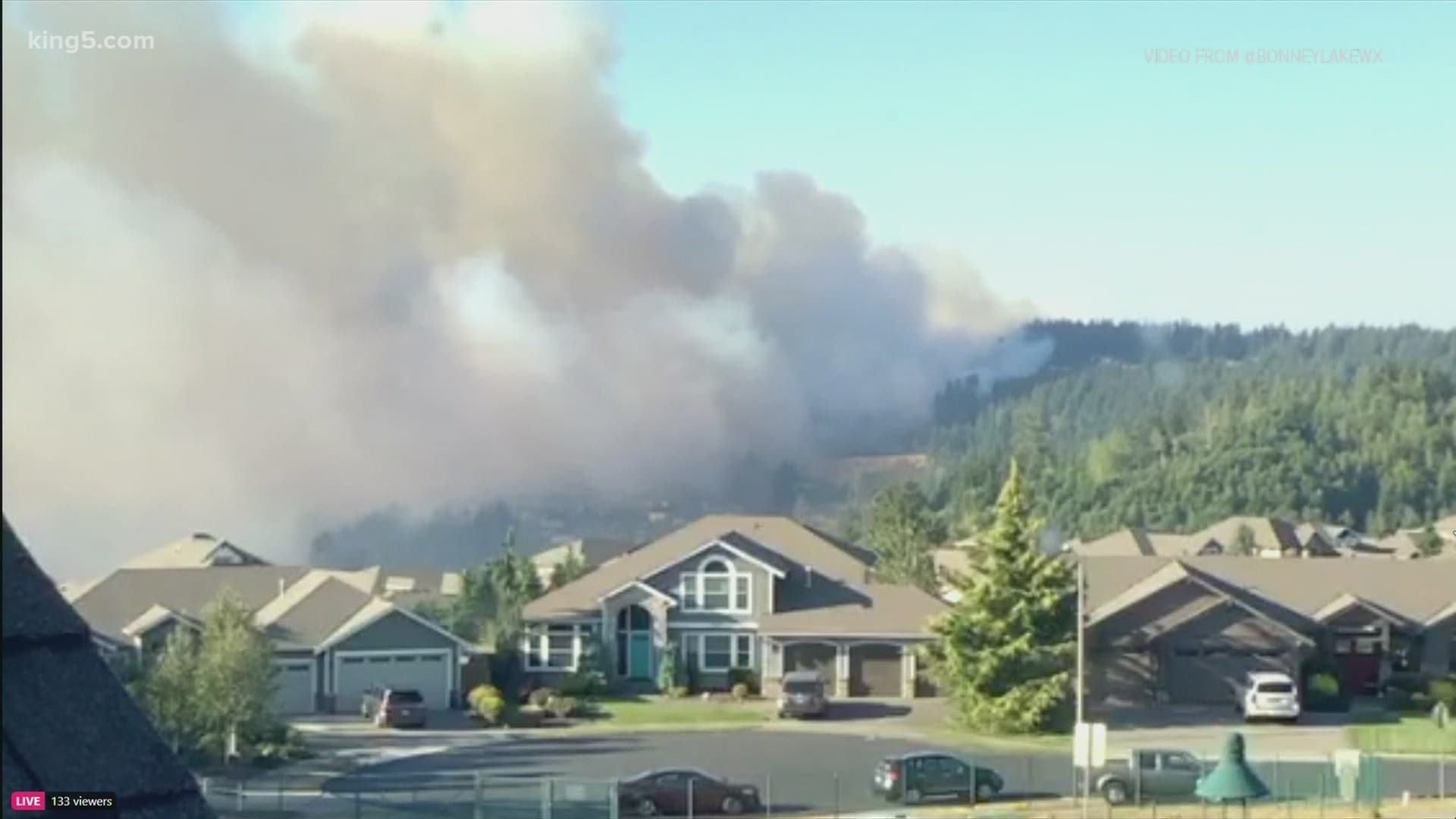SPOKANE, Wash. — As dozens of wildfires continue to burn across the West Coast, cities and towns around the Inland Northwest are inundated with smoke.
The air quality in Spokane and surrounding areas remains hazardous for the third day in a row on Monday.
According to the Centers for Disease Control and Prevention, wildfire smoke can irritate your lungs, cause inflammation, affect your immune system and make you more prone to lung infections, including SARS-CoV-2, the virus that causes COVID-19.
Even though a mask may help stop the spread of COVID-19, they don't all protect you from wildfire smoke.
Cloth face coverings and surgical masks used to slow the spread of COVID-19 won't filter out wildfire smoke particles, said Dr. Anh Nguyen, a senior medical director for the urgent care clinics at Providence.
The N95 respirator mask will filter out smoke and slow the spread of COVID-19 but the masks are still in high demand and should be saved for doctors and nurses.
"To complicate the situation, anti-pollution masks commonly have valves to help let air out and make breathing easier,” according to Plume Labs scientist Dr. Boris Quennehen. “Unfortunately, valves render the mask virtually useless in preventing the transmission of viruses - because it is designed to let air out, along with whatever else might be in that air."
Plume Labs recommends using an FFP2+ mask without valves in order to meet both needs.
Dr. Nguyen added that a good alternative to help alleviate both issues is to wear a cloth mask over the N95 mask with the valve.
N95 respirators are not an option for everyone, though, as they are not recommended for children, not as effective with facial hair and those with preexisting conditions should first consult with a healthcare provider, said Lisa Woodward with Spokane Regional Clean Air Agency.
Due to the COVID-19 pandemic, N95 and other NIOSH-approved respirators are also in short supply due to COVID-19 and they need to be reserved for those required to wear them for work.
The CDC recommends staying inside and using a portable air cleaner to protect yourself from wildfire smoke.
If you have a forced-air system in your home, you may need to speak with a qualified heating, ventilation, and air conditioning professional about different filters, HEPA or MERV-13 or higher to reduce indoor smoke.
The American Lung Association says protecting lung health should be part of a wildfire emergency plan and also has these recommendations.
- Stay indoors: People living close to the fire-stricken areas should remain indoors, unless prompted by local officials to evacuate, and avoid breathing smoke, ashes and other pollution in the area.
- Don't exercise outside: If you live close to or in the surrounding area, don't exercise outdoors, especially if you smell smoke or notice eye or throat irritation.
- Don't count on a dust mask: Ordinary dust masks, designed to filter out large particles, and cloth facial coverings will not help. They still allow the more dangerous smaller particles to pass through. Special, more expensive dust masks with an N-95 or N-100 filter will filter out the damaging fine particles, but may not fit properly and are difficult for people with lung disease to use. Due to the COVID-19 pandemic, N95 masks may not be readily available due to shortages and because they are needed for frontline health care workers. If you have lung disease, consult with your doctor before using an N95 mask. These masks can make it more difficult for anyone to breathe and should only be used if you must go outside.
- Take precautions for kids: Extra precaution should be taken for children, who are more susceptible to smoke. Their lungs are still developing, and they breathe in more air (and consequently more pollution) for their size than adults. N-95 m=masks should not be used for children because they will likely not fit properly.
- Roll up your car windows: When driving your car in smoky areas, keep your windows and vents closed, and operate on "recirculate" setting, including when using air conditioning.
- Protect the air in your home: Stay inside as much as possible, with doors, windows and fireplace dampers shut and preferably with clean air circulating through air conditioners and air cleaners. Use air conditioners on the recirculation setting to keep from pulling outside air into the room. Air cleaning devices that have HEPA filters can provide added protection from the soot and smoke. Place damp towels under the doors and other places where the outside air may leak in.
- Prepare to evacuate if directed. Listen very closely to your local or state officials and act when ordered to protect yourself and your family. In advance, prepare any medications, medical devices, emergency contact information and a list of prescriptions to take with you.
KGW's Cristin Severance and Brittany Falkers contributed to this report.


